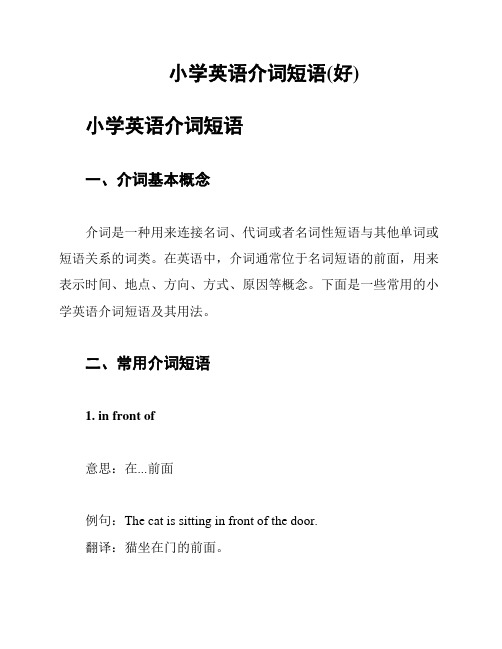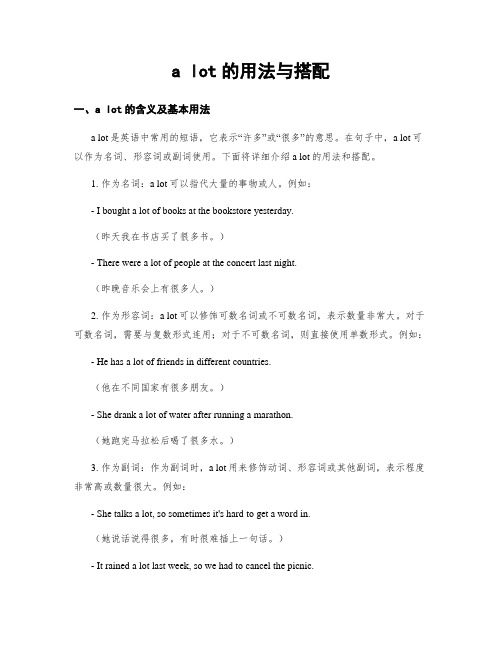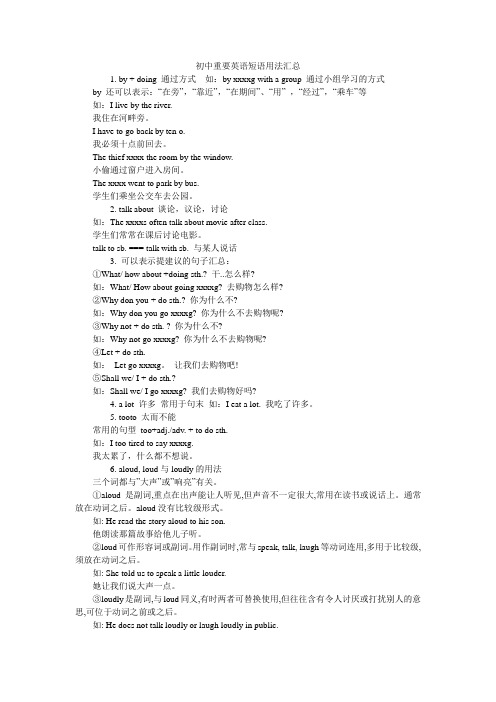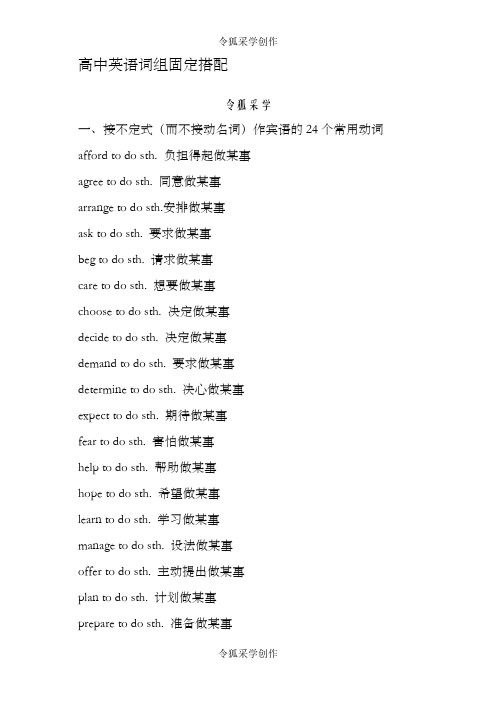英语常用短语的用法与练习(3)
小学英语介词短语(好)

小学英语介词短语(好)小学英语介词短语一、介词基本概念介词是一种用来连接名词、代词或者名词性短语与其他单词或短语关系的词类。
在英语中,介词通常位于名词短语的前面,用来表示时间、地点、方向、方式、原因等概念。
下面是一些常用的小学英语介词短语及其用法。
二、常用介词短语1. in front of意思:在...前面例句:The cat is sitting in front of the door.翻译:猫坐在门的前面。
2. at school意思:在学校例句:I study English at school.翻译:我在学校学英语。
3. on the table意思:在桌子上例句:The book is on the table.翻译:书在桌子上。
4. under the tree意思:在树下例句:We had a picnic under the tree. 翻译:我们在树下野餐。
5. with a friend意思:和朋友在一起例句:I like playing soccer with a friend. 翻译:我喜欢和朋友一起踢足球。
6. by the beach意思:在海滩旁边例句:They built sandcastles by the beach. 翻译:他们在海滩旁边堆沙堡。
7. for breakfast意思:作为早餐例句:I had cereal for breakfast.翻译:我吃了谷物当早餐。
8. after school意思:放学后例句:Let's go to the park after school. 翻译:放学后我们去公园。
9. in the morning意思:在早晨例句:I like to jog in the morning.翻译:我喜欢早晨慢跑。
10. with a smile意思:带着微笑例句:She always greets everyone with a smile.翻译:她总是带着微笑向每个人打招呼。
人教版初中英语八年级下册Unit3-课文讲解、知识点及练习

Unit3 Could you please clean your room?Section A重点短语go out for dinner 出去吃饭stay out late 在外面待到很晚go to the movies 去看电影get a ride 搭车work on 从事finish doing sth. 完成做某事clean and tidy 干净整洁do the dishes 洗餐具take out the rubbish 倒垃圾fold your/the clothes 叠衣服sweep the floor 扫地make your/the bed 整理床铺clean the living room 打扫客厅no problem 没问题welcome sb. 欢迎某人come home fro m school/ work放学/下班回家throw down 扔下sit down 坐下come over 过来take sb. for a walk 带某人去散步all the time 一直;总是all day/evening 整曰/夜do housework 做家务shout back 大声回应walk away 走开.share the housework 分担家务a comfortable home 一个舒适的家in surprise 惊讶地get something to drink 拿点喝的东西watch one show 观看一个节目hang out 闲逛pass sb. sth. 把某物传给某人lend sb. sth. 把某物借给某人get sth. wet 使某物弄湿hate to do sth. 讨厌做某事do chores 做杂务help sb. (to ) d o /with sth 帮助某人干某事bring a tent带顶帐篷来buy some snacks买些小吃go to the store去商店invite sb. to a party邀请某人参加聚会make sb. do sth. 使某人做某事enough stress足够的压力waste of time浪费时间in order to为了get good grades取得好成绩mind doing sth. 介意做某事depend on依赖;依靠develop children’s independence发展孩子的独立性look after/take care of 照顾;照看do one’s part in (doing ) sth.做某人分内的事二、重点句型1. Could you please…..do sth. ?Could you please clean your room?你能整理一下你的房间吗?2. I have to do some work.我必须干些活。
a lot的用法与搭配

a lot的用法与搭配一、a lot的含义及基本用法a lot是英语中常用的短语,它表示“许多”或“很多”的意思。
在句子中,a lot可以作为名词、形容词或副词使用。
下面将详细介绍a lot的用法和搭配。
1. 作为名词:a lot可以指代大量的事物或人。
例如:- I bought a lot of books at the bookstore yesterday.(昨天我在书店买了很多书。
)- There were a lot of people at the concert last night.(昨晚音乐会上有很多人。
)2. 作为形容词:a lot可以修饰可数名词或不可数名词,表示数量非常大。
对于可数名词,需要与复数形式连用;对于不可数名词,则直接使用单数形式。
例如:- He has a lot of friends in different countries.(他在不同国家有很多朋友。
)- She drank a lot of water after running a marathon.(她跑完马拉松后喝了很多水。
)3. 作为副词:作为副词时,a lot用来修饰动词、形容词或其他副词,表示程度非常高或数量很大。
例如:- She talks a lot, so sometimes it's hard to get a word in.(她说话说得很多,有时很难插上一句话。
)- It rained a lot last week, so we had to cancel the picnic.(上周下了很多雨,所以我们不得不取消野餐。
)二、a lot的常见搭配1. 后接不定式:a lot可以和动词不定式连用,表示“做许多某种行为”。
例如:- She has been studying a lot to prepare for the exam.(她为了准备考试一直在努力学习。
)- They need to practice a lot to improve their basketball skills.(为了提高篮球技巧,他们需要经常练习。
初中重要英语短语用法汇总

初中重要英语短语用法汇总1. by + doing 通过方式如:by xxxxg with a group 通过小组学习的方式by 还可以表示:“在旁”,“靠近”,“在期间”、“用” ,“经过”,“乘车”等如:I live by the river.我住在河畔旁。
I have to go back by ten o.我必须十点前回去。
The thief xxxx the room by the window.小偷通过窗户进入房间。
The xxxx went to park by bus.学生们乘坐公交车去公园。
2. talk about 谈论,议论,讨论如:The xxxxs often talk about movie after class.学生们常常在课后讨论电影。
talk to sb. === talk with sb. 与某人说话3. 可以表示提建议的句子汇总:①What/ how about +doing sth.? 干..怎么样?如:What/ How about going xxxxg? 去购物怎么样?②Why don you + do sth.? 你为什么不?如:Why don you go xxxxg? 你为什么不去购物呢?③Why not + do sth. ? 你为什么不?如:Why not go xxxxg? 你为什么不去购物呢?④Let + do sth.如:Let go xxxxg。
让我们去购物吧!⑤Shall we/ I + do sth.?如:Shall we/ I go xxxxg? 我们去购物好吗?4. a lot 许多常用于句末如:I eat a lot. 我吃了许多。
5. tooto 太而不能常用的句型too+adj./adv. + to do sth.如:I too tired to say xxxxg.我太累了,什么都不想说。
6. aloud, loud与loudly的用法三个词都与”大声”或”响亮”有关。
英语不定式(短语)用法全解析

英语不定式(短语)用法全解析摘要本文介绍了英语不定式(短语)的定义、形式和用法,并重点分析了不定式(短语)在句中作主语、表语、宾语和补足语的功能和特点。
本文还提供了一些例句和练习题,帮助读者理解和掌握不定式(短语)的用法。
一、什么是不定式(短语)1.1 不定式的定义不定式是动词的一种非谓语形式,在句中不能单独作谓语。
不定式具有动词的性质,它可以有自己的宾语和状语,从而构成不定式短语。
不定式也具有非动词的性质,相当于一个名词、形容词或副词,可以在句中担任主语、宾语、宾语补足语、表语、定语和状语等成分。
1.2 不定式的形式不定式的基本形式是由不定式符号to+动词原形构成,在某些情况下to也可省略。
不定式还可以有形式的变化,即一般式、进行式、完成式和被动式。
形式结构意义一般式to do表示与谓语动作同时或几乎同时发生,或在谓语动作之后发生的动作进行式to be doing表示正在进行的或与谓语动作同时发生的动作完成式to have done表示在谓语动作之前发生的动作完成进行式to have been doing表示在谓语动作之前发生并且一直进行着的动作被动一般式to be done表示被动意义,即逻辑上的主语是这个不定式表示的动作的承受者被动完成式to have been done表示被动意义,且在谓语动作之前已经完成的动作否定形式not to do表示否定意义,即逻辑上的主语没有做或不会做这个不定式表示的动作二、不定式(短语)在句中的用法2.1 不定式(短语)作主语不定式(短语)具有名词的特征,可在句子中充当主语。
不定式(短语)在句首作主语To know oneself is difficult. 人贵有自知之明。
用it作形式主语在很多情况下,人们通常用it作为形式上的主语,而把不定式(短语)移到谓语之后,使句子结构显得平稳一些。
It's rude to turn your back to your teacher and refuse to answer. 背对着老师,拒绝回答问题是不礼貌的。
2023年中考英语语法---动词及动词短语专题复习及练习题(含答案)

2023年中考英语语法---动词及动词短语专题复习及练习题(含答案)一、动词的基本框架动词包括实义动词、系动词、助动词和情态动词。
(一)实义动词实义动词是能独立作谓语的动词。
按其句法功能可分为及物动词和不及物动词;按其持续性可分为延续性动词和非延续性动词。
1.及物动词:及物动词本身意义不完整,需要接宾语才能使其意思完整。
(1)动词+宾语I like this book very much.我非常喜欢这本书。
(2)动词+宾语+宾补We call the bird Polly.我们叫这只鸟Polly。
I saw the children play in the park yesterday.昨天我看见孩子们在公园玩。
注意:用省略to的不定式或现在分词作宾补的动词有:have,see,watch,notice,hear等。
(3)动词+间接宾语+直接宾语Please pass me the salt.请把盐递给我。
常见的带双宾语的动词有:give,bring,buy,get,leave,lend,make,offer,pass,teach,tell等。
2.不及物动词不及物动词自身意思完整,不用接宾语。
Horses run fast.马跑得快。
(1)有些动词既可作及物动词又可作不及物动词。
We study English.我们学习英语。
(及物动词)We study hard.我们努力学习。
(不及物动词)(2)有些不及物动词与一些别的词搭配在一起构成动词短语,它的作用相当于一个及物动词。
①动词+介词Listen to the teacher carefully.仔细听老师讲。
此类动词短语后面的宾语无论是名词还是代词,都只能放在介词后面,不能放在动词和介词之间。
②动词+副词+介词Let’s go on with our work!让我们继续我们的工作吧!He gets along well with his classmates.他与他的同学们相处得很好。
高中英语固定搭配和常用短语用法归纳

高中英语词组固定搭配令狐采学一、接不定式(而不接动名词)作宾语的24个常用动词afford to do sth. 负担得起做某事agree to do sth. 同意做某事arrange to do sth.安排做某事ask to do sth. 要求做某事beg to do sth. 请求做某事care to do sth. 想要做某事choose to do sth. 决定做某事decide to do sth. 决定做某事demand to do sth. 要求做某事determine to do sth. 决心做某事expect to do sth. 期待做某事fear to do sth. 害怕做某事help to do sth. 帮助做某事hope to do sth. 希望做某事learn to do sth. 学习做某事manage to do sth. 设法做某事offer to do sth. 主动提出做某事plan to do sth. 计划做某事prepare to do sth. 准备做某事pretend to do sth. 假装做某事promise to do sth. 答应做某事refuse to do sth. 拒绝做某事want to do sth. 想要做某事wish to do sth. 希望做某事注:有些不及物动词后习惯上也接不定式,不接动名词:aim to do sth. 打算做某事fail to do sth. 未能做某事long to do sth. 渴望做某事happen to do sth. 碰巧做某事hesitate to do sth. 犹豫做某事struggle to do sth. 努力做某事二、接不定式作宾补的36个常用动词advise sb. to do sth. 建议某人做某事allow sb. to do sth. 允许某人做某事ask sb. to do sth.请(叫)某人做某事bear sb. to do sth.忍受某人做某事beg sb. to do sth. 请求某人做某事cause sb. to do sth. 导致某人做某事command sb. to do sth. 命令某人做某事drive sb. to do sth .驱使某人做某事elect sb. to do sth. 选举某人做某事encourage sb. to do sth. 鼓励某人做某事forbid sb. to do sth. 禁止某人做某事force sb. to do sth. 强迫某人做某事get sb. to do sth. 使(要)某人做某事hate sb. to do sth. 讨厌某人做某事help sb. to do sth. 帮助某人做某事intend sb. to do sth. 打算要某人做某事invite sb. to do sth. 邀请某人做某事leave sb. to do sth. 留下某人做某事like sb. to do sth. 喜欢某人做某事mean sb. to do sth. 打算要某人做某事need sb. to do sth. 需要某人做某事oblige sb. to do sth. 迫使某人做某事order sb. to do sth. 命令某人做某事permit sb. to do sth. 允许某人做某事persuade sb. to do sth. 说服某人做某事prefer sb. to do sth. 宁愿某人做某事request sb. to do sth. 要求某人做某事remind sb. to do sth. 提醒某人做某事teach sb. to do sth .教某人做某事tell sb. to do sth. 告诉某人做某事train sb. to do sth. 训练某人做某事trouble sb. to do sth. 麻烦某人做某事warn sb. to do sth. 警告某人做某事wish sb. to do sth. 希望某人做某事注:不要受汉语意思的影响而误用以下动词句型:汉语说:“害怕某人做某事”,但英语不说fear sb. to do sth.。
人教版九年级英语上第三单元词汇-短语级句子翻译和练习(无答案)

Unit 3名词:1.restroom n. 洗手间,公共厕所例句:你能告诉我洗手间在哪里吗?Could you tell where I can find a restroom?练习:我正在找卫生间。
2.Stamp n 邮票,印章例句:你能告诉我我在哪里能买到邮票吗?Could you tell me where i can buy some stamps ? 练习:我想买些邮票。
3.Bathroom n. 浴室,洗手间翻译句子:你能告诉我洗手间在哪里吗?4.Grape. 葡萄(可数名词)例句:我想吃葡萄I want to eat some grapes .练习:我想买些葡萄5.East n. 朝东---eastern 朝东的,东边的例句:太阳从东边升起The sun rises in the east.中国的东部很发达The eastern part of China is very developed.练习:沿着这条街朝东走(go east )6.Corner n. 拐角around the corner adv. 在转角处,即将来临。
例句:她正站在角落She is standing in the corner.练习:你的生日马上就到了,我们应该为生日会做准备了(prepare for)7.Address n. 地址例句:请告诉我你的地址please tell me your address .练习:请写下你的地址。
(write down )8.Request n. 要求request v. 要求request sb to do sth 要求某人做某事at the request of sb 应某人的要求例句:He was there at the request of his manager.例句:告诉我你的要求Tell me your requests .他要求我离开He requested me to leave.练习:我们要求推迟会议。
- 1、下载文档前请自行甄别文档内容的完整性,平台不提供额外的编辑、内容补充、找答案等附加服务。
- 2、"仅部分预览"的文档,不可在线预览部分如存在完整性等问题,可反馈申请退款(可完整预览的文档不适用该条件!)。
- 3、如文档侵犯您的权益,请联系客服反馈,我们会尽快为您处理(人工客服工作时间:9:00-18:30)。
英语常用短语的用法与练习(3)11. as for至于,关于;用法:as to 和as for表示“就……而论”“有关”或“至于”。
但二者用法不尽相同。
as to 的功能类似于with regard to,regarding,on the matter of,concerning 等,常用于相当正式的语境中,尤其用于争论和做出决定时。
可放于句首或与wh- 疑问词引导的动词不定式和名词性从句连用(有时可省略),而as for 无此种用法。
例如:As to the journey,we must decide about that later.至于旅行,我们必须以后再作决定。
as to 有时用于表示according to 的含义。
例如:They sorted the eggs as to size and color.as for 和as to 都可用于句首,引出一个与前一个话题稍微有些不同的话题,但as for 在语体上不如as to 正式,并且着重话题的转换,也就是说,它所引导的是前面尚未提到过的新的事情,因此它不能用于文章的开头。
另外,as for 有时表达轻蔑的语气。
例如:We had a delightful weekend in the country. As for the traffic,we had no difficulty.在乡下我们度过了一个愉快的周末。
至于交通,我们没有遇到任何困难。
例句:①As for you, you ought to be ashamed of yourself.至于你, 你应该感到惭愧。
②You can have a bed;as for him,he'll have to sleep on the floor.有一张床给你,至于他,就只能睡在地板上了。
③As for him,I know nothing.至于他,我一点也不了解。
as短语:as to 至于,关于;提到;就……而论(至于,说到);配套练习:(1).完成句子:①He was uncertain _____ (至于) which road to take.②Would you be so kind _____ (至于) help me to move the stone?③______ my past, I’m not telling you anything.(2).单项填空①_____ two exams to worry about, I have to work really hard this weekend.A. WithB. BesidesC. As forD. Because of②One of the purposes of United Nations is to achieve international co-operation without distinction as to race,____, language or religion.A. sexB. femaleC. maleD. skin③_____ no need for as to do the experiment again, it was mot long before we left the chemistry lab.A. There hasB. There wasC. There beingD. It being④Would you be so kind as to _____ me ten minutes?A. spendB. saveC. spareD. share12. pay attention to 注意;用法:pay attention to 后面可以直接加名词、代词或者动名词,但是值得我们注意的是,这里的to是一个介词,并不是能构成动词不定式的,这和look forward to是一样的。
所以呢,这个词组后面要接动词的话,那麽就要在动词后加ing了。
例句:①You should pay attention to your spelling.你要注意自己的拼写。
②We had paid attention to him. 我们已经注意到他了。
③They paid attention to watching the scene. 他们注意到了观察现场。
attention短语:bring sth. to one’s attention 使某事引起某人注意;call/draw one’s attention to sth. 使某人注意某事;draw/catch/attract one’s attention 引起某人的注意;fix/focus/concentrate one’s attention on sth. 集中注意力于某事物;配套练习:(1).完成句子:①他的提议没有引起任何注意。
No attention ______ his advice.②他提醒我注意一些新的证据。
He ______ some new evidence.(2).单项填空:①Every year China’s Autumn Export Commodities _____ in Guangzhou attracts much attention of more and more businessmen or merchants all over the world.A. FirmB. ShowC. FairD. Exhibition②Don’t worry. Your child is old enough to himself.A. take care ofB. care forC. looking afterD. pay attention to③--- At what time did you _______ the office?--- Oh, sorry. I didn’t pay any attention to the time when I came in.A. returnB. return toC. come backD. go back④The struggle against sand storm will not end _____ victory unless we pay much attention to the balance of nature.A. atB. inC. forD. with⑤_____, I have to put it away and focus my attention on study this week.A. However that story is amusingB. No matter amusing the story isC. However amusing the story isD. No matter how the story is amusing13. badly off穷的;处境差的;缺少的;例句:①I am quite badly off recently. 最近我经济上很拮据。
②His health is worse off than before. 他的身体状况比以前更糟糕了。
③The refugees are badly off for blankets, and even worse off for food. 难民需要毯子, 更需要食物。
④Capitalism can make you well off.资本主义可以让你变得富裕。
短语:be badly off for sth. 需要(某物);(某物)供应不足;worse off 境况更差;更穷困;well off 富裕;处境好(比较级:better off境况更佳);配套练习:单项填空:①Though he was _____ , he looked down upon those who had a lot of money.A. well offB. richC. badly offD. well–known②We shouldn’t complain about being poor because many families are much _____.A. better offB. badly offC. well offD. worse off③We aren't too badly off but we can't afford a house like that.A.well offB.badly offC.worse offD.better off④The refugees are badly off for blankets, and even worse off for food.A.badly off; worse offB.well off; better offC.badly off; better offD.well off; worse off14. because of因为;由于because of是介词短语,后跟名词、代词或动名词及what从句。
如:She got hurt because of what you’d said.她因为你的话而受到伤害。
辨析:(1)due to/ thanks to/ owing to/ as a result ofdue to 意为“由于”常作表语,也作后置定语和状语。
thanks to意为“多亏;由于”只作状语。
owing to意为“由于”常作状语。
as a result of意为“由于”作状语。
(2)because/as/since/forbecause表示直接原因,语气最强。
回答why提出的问题只能用because。
在强调句型中,也只能用because。
as用于解释做某事的原因,语气较弱,通常位于主句前。
since表示的原因是指人们已知的事实,常意为“既然”。
语气比because 弱,但比as强。
通常位于主句前,并常与as换用。
for并列连词,连接并列分句,表示一种补充说明,是推测或判断的理由,语气较弱,不可位于主句前。
有时可表示直接原因,相当于because。
配套练习:单项填空①People crowded on the road and could not go forward ____ the traffic accident some cars had made.A. withB. sinceC. because ofD. because②I said nothing about it, _____ his wife’s being there.A.because ofB.becauseC.sinceD.as③He knew she was crying _____ what he had said.A.asB.because ofC.because ofD.since④Tom’s absence was _____ the rain.A.because ofB.becauseC.due toD.since15. before long不久以后;用法:before long 是介词短语,意为“不久以后”“不久”,所在句中的谓语动词可用于各种时态。
